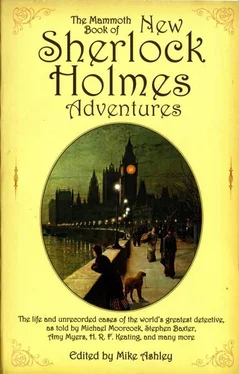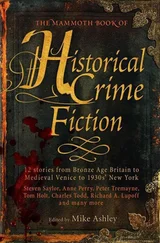Mike Ashley - The Mammoth Book of New Sherlock Holmes Adventures
Здесь есть возможность читать онлайн «Mike Ashley - The Mammoth Book of New Sherlock Holmes Adventures» весь текст электронной книги совершенно бесплатно (целиком полную версию без сокращений). В некоторых случаях можно слушать аудио, скачать через торрент в формате fb2 и присутствует краткое содержание. Жанр: Детектив, на английском языке. Описание произведения, (предисловие) а так же отзывы посетителей доступны на портале библиотеки ЛибКат.
- Название:The Mammoth Book of New Sherlock Holmes Adventures
- Автор:
- Жанр:
- Год:неизвестен
- ISBN:нет данных
- Рейтинг книги:5 / 5. Голосов: 1
-
Избранное:Добавить в избранное
- Отзывы:
-
Ваша оценка:
- 100
- 1
- 2
- 3
- 4
- 5
The Mammoth Book of New Sherlock Holmes Adventures: краткое содержание, описание и аннотация
Предлагаем к чтению аннотацию, описание, краткое содержание или предисловие (зависит от того, что написал сам автор книги «The Mammoth Book of New Sherlock Holmes Adventures»). Если вы не нашли необходимую информацию о книге — напишите в комментариях, мы постараемся отыскать её.
Marianne is an important fictional formulation of Sand's thinking on the role of women and the nature of democracy. This edition includes a long biographical preface which quotes extensively from her correspondences.
The Mammoth Book of New Sherlock Holmes Adventures — читать онлайн бесплатно полную книгу (весь текст) целиком
Ниже представлен текст книги, разбитый по страницам. Система сохранения места последней прочитанной страницы, позволяет с удобством читать онлайн бесплатно книгу «The Mammoth Book of New Sherlock Holmes Adventures», без необходимости каждый раз заново искать на чём Вы остановились. Поставьте закладку, и сможете в любой момент перейти на страницу, на которой закончили чтение.
Интервал:
Закладка:
stepped outside for only a moment. Had I not been so untrained in the art of detection in those early days, I should have noticed that the muddy trail within the house had no corresponding source in the gutters without. Now I comprehend: the muddy footprints in the antechamber were set there in advance, moulded from clay."
With a smile, Ambrose Bierce acknowledged his handiwork. "Brilliant, wasn't it? All the various details – the footprints leading to nowhere, the scorched floorboards, the decapitated umbrella, even the two impeccable witnesses brought to the scene by a pretext – all the details were part of my scheme, sir."
"And yet you vanished into thin air…" I began.
"Not at all, sir. 'Twas simplicity itself. When I came out the house's front door to greet my callers from the bank, the foyer was already bedecked with the tokens of my abduction. I went back in through the front door as James Phillimore, took a moment to call out for help while I donned a cobbler's smock and yanked off my false whiskers… and then I slipped out the back way, like any respectable tradesman."
Aleister Crowley chuckled. "Because James Phillimore was heard to cry for help, the witnesses assumed that he disappeared against his will. It never occurred to anyone that he'd done a bunk voluntarily."
Sherlock Holmes arose from the park bench and – with great solemnity – bowed to Ambrose Bierce, then reseated himself. "Come now, sir!" said my companion to Bierce. "I confess that you foxed me. Now for the rest of the tale, if you please: why, after so many years, has James Phillimore resurfaced of a sudden?"
This time it was Bierce's turn to chuckle. "Although I left England shortly before the birth of Emily Crowley's only child, I corresponded with her secretly. She kept me apprised of her son's progress. In 1897 – following the death of Edward Crowley, Senior – I took the liberty of writing to his heir, and revealing my role in his past. I also mentioned my family's tradition of forenames beginning with the letter A."
Crowley nodded. "That was the year in which I changed my forename to Aleister."
"We have maintained our correspondence ever since," Bierce revealed. "In the meanwhile, my tasks as a journalist have obliged me to travel throughout the United States without ever returning to Europe.Young Crowley here has journeyed to Russia and Tibet, but never until now has he visited America. My wife died in April of last year, and my two sons that I had off her have been dead these past five years: one of them a suicide. I am therefore alone, which means that I am in bad company. I live in Washington at present, but I make frequent trips to New York City to call upon my employer Mr Hearst. When Aleister Crowley wrote to me a few months ago from his home in Scotland, informing me of his intention to visit New York, I decided that we should meet at last."
"But why bring James Phillimore back from the dead?" queried Sherlock Holmes.
"That was part of the joke," answered Aleister Crowley, placing his hand upon Bierce's shoulder fondly. "I have always had a taste for bizarre jests. My mother's husband was entirely devoid of humour, yet Ambrose Bierce's wit is keenly similar to my own: I should like to believe that I have inherited this from him. Several years ago, Father Ambrose – as I choose to call him – sent me a cabinet photo of himself in his James Phillimore disguise, with a letter recounting the hoax in all its delicious details. When I agreed to call upon Mr Bierce at the Cosmopolitan offices, I decided to amuse myself by visiting him in the guise of James Phillimore. I had the costume made up in London before my departure."
"Clearly my own sense of humour and Aleister Crowley's run on similar lines," said Ambrose Bierce. "For we both hatched the same notion independently, and I too decided to resurrect James Phillimore for our meeting. I still had the suit handy in camphor-balls, so I let it out a bit and bought some stage-whiskers to match the ones I wore thirty years ago. Say, all the boys in Hearst's office busted out laughing fit to kill when I walked in there dressed like Prince Albert. Then, when young Aleister here came traipsing into the room in the same get-up…"
"I can imagine the hilarity," said Sherlock Holmes, without smiling. He rose again from the bench, beckoning me to join him whilst he strode towards the cab-rank at the southern edge of Madison Square. "Watson, come! We still have time to see Maude Adams give her evening performance at the Empire." Turning back, my friend doffed his hat to the pair of erstwhile
Phillimores. "Adieu, gentlemen," said Sherlock Holmes. "I suggest that James Phillimore's latest vanishing-act should be his farewell performance. Since Doctor Watson and I are on our way to San Francisco – where the list of recent deaths is a prodigious one – I can easily arrange for James Phillimore's name to be inserted among the rolls of the dead. Let us keep him that way. Farewell!"
The Case of the Last Battle – L. B. Greenwood
After the last case and that of "The Lion's Mane" Holmes kept himself to himself for several years until the ominous rumblings of war brought him into government service in the episode recorded by Watson in "His Last Bow". That was the last published case of Sherlock Holmes, set in 1914. There have been many who have written apocryphal cases of Holmes's wartime adventures and continuing cases into the 1920s, but I believe almost all of these are apocryphal. But there was one last case, the details of which remained hidden in the archives of the War Office until Canadian author and Sherlockian, Beth Greenwood, unearthed them. Here, at last, is the very final case of Sherlock Holmes.
"He's dead, sir."
"I know that, Jackson," I snapped.
Quite unpardonably, but I was still wet with the boy's blood, and his death was only the last of so many. For this was early November of 1918, I was the sole doctor in the field dressing station, and if any few acres in all history had been as tortured as those around Ypres, I have never heard of it.
A mug of something hot and brewed – front-line coffee could seldom be told from tea – was poked into my hand. "Thanks, Jackson. Sorry about the temper."
" 'S all right, sir. Wot 'bout them in the corner? They're quiet enough now, but…"
Stiff-legged with exhaustion, I staggered over to the five mounds of blankets. No cots could be spared for the merely sick, no matter how desperate their condition, nor could we hope that any ambulance would have room for several days. Not
after such an attack as had all too recently once again blasted this segment.
Of course we had dealt with illness from the earliest days of the war. (In fact, my first medical task for the army had been to inform a furious major that he had contracted measles.) The present sickness, however, was one that I hadn't seen until a month or so ago, since when an increasing number of cases from both sides had been brought to my station.
The cause seemed to be some kind of respiratory infection, with a high fever, furiously aching limbs, and all too often an agitated delirium. For a small dressing station over-run by wounded, attended by one elderly doctor whose only assistant had until a year ago been a butcher's apprentice at Smithfield, the sufferers made very disruptive patients, poor fellows.
So, sometime during the previous night, I had injected the present five victims with morphine. One I now found had died, two were still deeply unconscious, three were beginning to stir, with amazingly cool skin and regular breathing. This was far better than I had expected: mortality of fifty per cent or more had been common. I told Jackson to soften some hardtack in boiled water – we had nothing better to offer – and to start sponging them off, with now at least some hope of their remaining clean.
Читать дальшеИнтервал:
Закладка:
Похожие книги на «The Mammoth Book of New Sherlock Holmes Adventures»
Представляем Вашему вниманию похожие книги на «The Mammoth Book of New Sherlock Holmes Adventures» списком для выбора. Мы отобрали схожую по названию и смыслу литературу в надежде предоставить читателям больше вариантов отыскать новые, интересные, ещё непрочитанные произведения.
Обсуждение, отзывы о книге «The Mammoth Book of New Sherlock Holmes Adventures» и просто собственные мнения читателей. Оставьте ваши комментарии, напишите, что Вы думаете о произведении, его смысле или главных героях. Укажите что конкретно понравилось, а что нет, и почему Вы так считаете.












